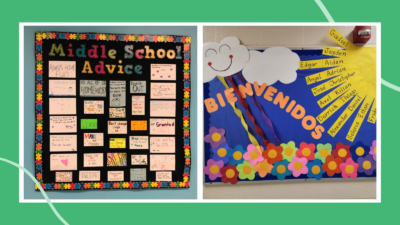Dear We Are Teachers,
This year, I have my best friend’s child in my class. I love my friend and her kid dearly, but he is … a handful. He’s bright, funny, and energetic—but also disruptive, argumentative, and constantly pushing boundaries in my classroom. Normally I’d manage it like I do with any other student, but the fact that I’m close friends with his mom makes everything complicated. Do I tell her the truth when she casually asks, “How’s he doing in your class?” Or should I downplay it to avoid hurting her feelings? I don’t want to damage our friendship, but I also don’t want to compromise my professionalism. So far I’ve been staying pretty vague. How do I handle this without losing either my friend or my sanity?
—How Do I Say “Your Kid’s Bonkers, Claire”?
Dear H.D.I.S.Y.K.B.C.,
Oh, neat! The universe decided to test your friendship and your sanity, all in one semester!
First, let’s acknowledge the obvious: You’re in a tough spot. You care about your friend, her child, and your classroom. That’s a lot of caring, and probably why you’re feeling stuck between vague updates and full-blown honesty.
Here’s the thing: You’ve got to be honest with her. Sooner rather than later. Tell her what’s going on, but with kindness and context.
“You know I love Charlie. He brings fabulous energy to class every day and he’s a great kid. We are working on some classroom behaviors that are getting in the way of his learning, and I wanted to keep you in the loop just like I would with any other parent.”
If your friend is truly a good friend, she’ll appreciate your professionalism and your willingness to support her child—even when it’s not all sunshine and sticker rewards.
Dear We Are Teachers,
I’m at my wit’s end. I teach 8th grade English, and most of my students didn’t know what a complete sentence was when I asked the other day. Commas? Optional. Sentence structure? A mystery. They’re strong readers, but they’re missing so many grammar basics. What am I supposed to do when the pacing guide has them writing multi-paragraph essays, but they don’t even know what a topic sentence is?
—Grammatically Grieving in Georgia
Dear G.G.I.G.,
*Steps on soapbox*
Grammar must be studied directly and in isolation before it can be studied in context. Thank you.
*Steps off soapbox*
This is the soapbox speech I would give to districts who still insist that all students can just magically learn grammar in context. It sounds like yours might fit in that category.
However, it doesn’t sound like your students are otherwise behind on literacy. The fact that they are strong readers is very encouraging. So in this case, I recommend bringing back an old-school staple: D.O.L., or Daily Oral Language. The D.O.L. is a classroom routine where students correct sentences that contain grammar, punctuation, capitalization, or usage errors.
One might look like this:
“the dog runned down oak street”
Students would be asked to identify and correct the errors:
“The dog ran down Oak Street.”
First, map out the skills your students still need to master. Then, write (or have a robot write) one sentence for each day that, over the course of the year, will rotate in all the grammar skills they still need to master. Think of it as building in grammar calisthenics—short, daily exercises to build up those grammar muscles (without derailing their main English class workout).
Dear We Are Teachers,
I have a student teacher this semester who is enthusiastic, friendly … and extremely chatty. She’ll strike up conversations with students during independent work time, linger too long in the hallway with colleagues, and eats up my conference time with her talking. I’ve redirected her multiple times and tried to encourage her to leave after the bell so I can get some work done, but she doesn’t seem to get the hint. I want to support her growth, but I also need her to read the room (and the clock). How do I rein in the chatter without crushing her spirit?
—Trying To Teach, Not Yap
Dear T.T.T.N.Y.,
Even just reading this question makes me want to run through a glass wall. Not just because losing planning time is infuriating, but correcting someone who works closely with you is—there’s no way around it—awkward.
Let’s look at the bright side, though. You’ve got someone who’s eager, personable, and clearly wants to connect. That’s a solid foundation. But as you know, teaching isn’t just about being friendly—it’s about knowing when to zip it so students can think, work, and, you know, learn.
Here’s what I would do with this golden retriever/podcast host hybrid:
- Set a formal check-in. The next time you are due to give feedback, be explicit that something she can work on is time management—specifically taking advantage of time in the day to get work done. Because honestly, if she’s talking this much, there’s work she’s not doing.
- Set clear boundaries. Student teachers are still learning the invisible rules of teaching—like how “conference time” isn’t code for “let’s unpack our weekend.” Be direct about boundaries and model what professional time management looks like.
- Play to her strengths. Channel that chattiness into something productive. Maybe she can lead a small-group discussion, facilitate a class debate, or host a club that meets before or after school (while you grade in the corner and supervise!).
Don’t be afraid to be honest. Help her see that connecting with others is absolutely a strength—when it’s used intentionally.
Do you have a burning question? Email us at askweareteachers@weareteachers.com.
Dear We Are Teachers,
I’ve been teaching for nearly a decade, and lately, admin has been nudging me toward leadership roles—department chair, maybe even assistant principal down the line. I’m flattered but also skeptical. I’ve seen what leadership looks like at my school: nonstop meetings, no time with kids, and even less appreciation than teachers get. I care deeply about making things better, but I don’t want to leave the classroom just to drown in bureaucracy. Is it possible to lead and love your job too? Or am I just signing up for a different kind of burnout?
—Ambitious but Apprehensive



